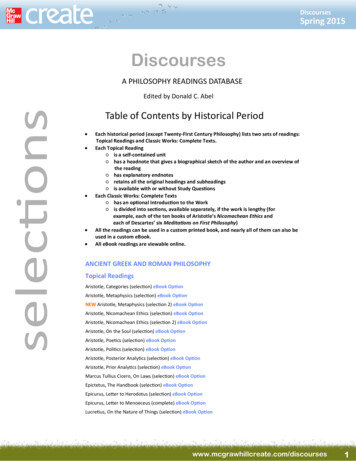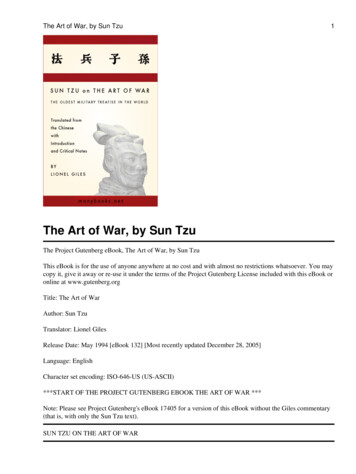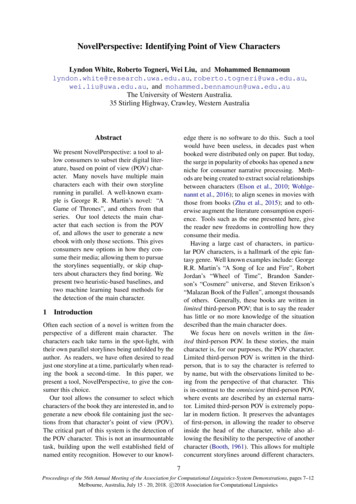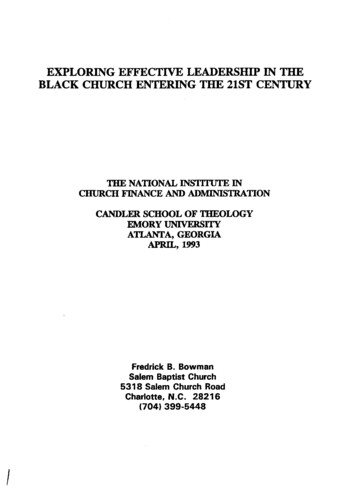
Transcription
Church Leadership 101: What Every Church Leader Needs to Know 2012 by Greg Atkinson. All rights reserved.S criptures taken from the Holy Bible, New International Reader’s Version ,NIrV Copyright 1 995, 1 996, 1 998 by Biblica, Inc. Used by permission ofZondervan. www.zondervan.com The “NIrV” and “New International Reader’sVersion” are trademarks registered in the United S tates Patent and TrademarkOffice by Biblica, Inc. S cripture taken from the New King James Version . Copyright 1 982 byThomas Nelson, Inc. Used by permission. All rights reserved.S cripture taken from Holy Bible, New Living Translation copyright 1 996,2004, 2007 by Tyndale House Foundation. Used by permission of Tyndale HousePublishers Inc., Carol S tream, Illinois 601 88. All rights reserved.S cripture quotations are from The Holy Bible, English S tandard Version (ES V ), copyright 2001 by Crossway, a publishing ministry of Good NewsPublishers. Used by permission. All rights reserved.S cripture taken in this publication are from THE MESSAGE. Copyright byEugene H. Peterson 1 993, 1 994, 1 995, 1 996, 2000, 2001 , 2002. Used bypermission of NavPress Publishing Group.S cripture taken from the Amplified Bible, Copyright 1 954, 1 958, 1 962, 1 964,1 965, 1 987 by The Lockman Foundation. Used by permission.Cover design by Aaron Stockton.
TABLE OF CONTENTSIntroduction1. The Interruptions Aren’t Interruptions2. Don’t Waste My Time3. You’re Under Authority4. Sometimes You Can and Should Get Fired5. Don’t Burn Bridges6. Mentor and Have a Mentor7. Lead Like Jesus8. You Have an Enemy9. Stay Humble10. Stay On Your Knees11.Stay In the Word12. Stay Pure13. Personal Touch14. Are You an Equipper or a Doer?15. Why a Hard Worker Is Not Always a Good Leader16. The Intentional and Strategic Leader17. Nobody Is Irreplaceable18. The Pain of Following a Leader With No Vision3
INTRODUCTIONI’ve had some interesting conversations and some frustrating experiencesin my career and it led me to a series of blog posts that is now an eBook.Basically, after almost two decades of local church ministry combined withconsulting with churches around the country (and running my ownbusiness), I have formed some leadership philosophies and best practices,and would like to share them with you here.Please understand my heart and intent is to sincerely help you be better atwhat you do and help you be a better, more effective, more understandingand stronger leader. I encourage you to read this with an open mind andzoom in on the chapters that you need to focus on most. I also encourageyou to share this with your staff/team.I know some of you are my peers. Many of you have been at this longer andhave much to offer. Some of you are new to ministry or are still hungry andwanting to grow in your given ministry. What I’m wanting to discuss isborn out of life experience – not really book knowledge. It’ll be acombination of common sense mixed with wisdom that I’ve learned alongthe way. Whatever your situation, I think you’ll be able to learn or re-learnsomething useful as well as contribute to the conversation via email. If youthink of another 101 lesson that you’d like me to write about in a follow-upeBook, email me at greg@gregatkinson.com.For this introduction, I’d like you to send me your best tips for churchleadership. What have you learned the hard way? What do you consider tobe essential? What’s one thing you think every other pastor, staff memberand volunteer should know?4
!1!The Interruptions Aren’t InterruptionsYeah, I said it. When you get that knock on your door and look up to seesomeone standing in your doorway saying, “Do you have a moment?” –they’re not interrupting your work. They ARE your work. Ministry is aboutpeople; it always has been and always will be.One thing that bugs me is hanging out with pastors that say (not jokingly),“Ministry would be great if it weren’t for the people.” It pains my heart thatpastors and Church leaders don’t get this simple truth. We are the Body ofChrist and every member is important and special. We are called toshepherd God’s people and that involves getting our hands dirty and yes,being bothered and interrupted.IMPORTANT: This isn’t about being an introvert or extrovert. This is aboutbeing sensitive to the Holy Spirit, Who is always at work around us. Asministers, we should seek the opportunities to show and express Christ’slove to those we lead and serve.Speaking of seeking opportunities: You have to be intentional. What does5
your weekly schedule look like? How many breakfasts, coffees and lunchesdo you schedule each week? I fill my calendar with people meetings andhave for 18 years. If you go from administrative meeting to meeting andnever schedule any time with your volunteers and staff, you’re missing acrucial part of leadership and the opportunity to be God in the flesh tosomeone in need.So where do you go from here? Here’s an action item: When you noticesomeone down, frustrated, hurt or just not themselves, you should takethe initiative to ask if they need someone to talk to or how you can pray forthem. When you’re in the midst of busy/office work and someone calls,texts, emails, IMs, or drops by your office – take the time to listen andserve. Be the hands and feet of Christ to those you come in contact with –it’s what we’re called to do and you’ll be a better and more trusted,respected and loved leader because of it.QUESTIONS FOR DISCUSSION:So – confession time: Have you ever been in the midst of busy/office workand had someone drop by un-announced? How did you handle it? Do youhave the presence of mind to be sensitive to the Spirit?6
!2!Don’t Waste My TimeIt’s the thought and unspoken cry of all of your volunteers: “Don’t waste mytime.” This is a lesson I learned at the age of 21 and have practiced for thelast 14 years. Adults lead busy lives. They have families and hard jobs andshow up at a rehearsal tired, frazzled and a little ready to walk out the doorat the drop of a hat. It’s crucial that you as the leader understand the twoP’s: Be PUNCTUAL and Be PREPARED.First, be punctual. Punctual is defined asstrictly observant of an appointed or regular time; not late; prompt.” Thisissue is what really inspired this series of Church Leadership 1o1. This pastSunday night I was dropping my kids off at a children’s function at achurch. My wife normally takes them on Sunday nights, so this was my firsttime taking them to this event. The function started at 5:30pm so I arrivedat 5:15pm. The parking lot was empty. I thought this event must have beencancelled for this week. I guess the other families are so used to the leadershowing up late that they arrive right at 5:30pm.I sat in my car upset and frustrated that this leader was wasting my time, as7
I couldn’t just leave my kids with no one there to watch them, I had to waitfor this leader to show up and unlock the church. You know what time shefinally showed up? 5:38pm! I was furious. I started to gather my kids fromthe playground and say, “Let’s leave.” – as to teach the leader this very basicleadership principle: “Don’t waste my time.”Hear me: If an event or activity starts at 5:30pm, the leader should arrive atleast by 5:15pm. At the very least. Leaders should be the first to arrive andthe last to leave. Every ministry and rehearsal I’ve ever led, I’ve been thefirst to arrive. This is Church Leadership 1o1. And worship leader friends –don’t play the “artist” card. Nobody wants to hear that you’re an artist andyou’re never on time. Get a watch and be prompt and punctual. Movingon The second P is prepared. Never waste your team’s time at a meeting orrehearsal. If you’re leading a meeting, have a set agenda and stick to it. Ifyou’re leading a rehearsal, have the worship sets, service orders and musiccharts all set, prepared and ready to go. When my band walked intorehearsal they could always go straight to their music stand and find theirfolder with the set list and all the charts 3 hole punched and placed in orderin their folder. I even had the corners of pages turned up and ready to beflipped. I had special notes highlighted for each player and a big markshowing them when to come in and start playing.It’s a matter of respect and understanding. You must realize that yourvolunteers lead busy lives and they will leave your ministry if you’re notpunctual and prepared. These are two key factors that I teach when I speakon “How to Attract and Keep Quality Musicians.” You have to always keepin mind that time is the most precious thing any of us have. You can getmore money. You can never get back time. When you waste time – it’sgone forever.8
QUESTIONS FOR DISCUSSION:How can you improve in this area of your ministry and leadership? Are youthe first to arrive for a meeting or rehearsal? Do you have the mindset thatearly is on time and on time is late?9
! 3!You’re Under AuthorityI’ll make this brief: Anyone in ministry is a person under authority. Fromthe senior pastor answering to a board, trustees or the congregation(depending on your governance) to the executive pastor answering to thesenior pastor, to all staff (paid and volunteer) answering to the executivepastor or senior pastor. Everyone reports to somebody and should be heldaccountable.Ultimately, we all answer to the Head of the Church: Jesus Christ.Colossians 3:23 tells us “Whatever you do, work at it with all your heart, asworking for the Lord, not for men.” But on a practical, day-to-day workingrelationship, how does this whole concept work itself out?Basically, we need to keep in mind that there are no lone rangers inministry. Ministry should be done as a team and everyone should havesomeone that holds them accountable for goals set, discipline, and growthas a professional and a leader.10
In a meeting, when something is being discussed, you have every right tospeak up, voice your opinion and fight for something you’re passionateabout, but once the decision has been made, you must get on board andchampion that cause as if it was your idea.Last week, I spoke at the National Outreach Convention in San Diego. I meta man from a known church in Texas and he told me he was on staff thereand I went on to share with him my experience of visiting there and takinga tour. My team and I, years earlier, had been led on a tour by a disgruntledstaff member who bashed the pastor and begged us to hire him. It washorrible. I remember driving away from that church and hearing our pastorsay, “Don’t ever act like that to visitors.”If you have something against your senior leadership (pastor, executivepastor, or elders/deacons) – keep that to yourself and take the initiative toseek them out (Matt. 18) and discuss your grievance with them privately.Don’t bad mouth your leadership to others inside or outside the church.QUESTIONS FOR DISCUSSION:So, what about you? How do you handle issues of authority in yoursituation? Have you ever fought hard for an idea and had it shot down?How did you respond?11
! 4!Sometimes You Can and Should Get FiredYesterday was a happy day for me (a huge Cowboys fan). I had beencampaigning for years to get Wade Phillips fired. Actually, I never wantedhim to get hired (there’s a lesson there – make sure you hire the rightpeople), but I had spent the last 3 years calling for his firing.Bottom-line: If you can’t do your job and do it well, you don’t deserve a job.We are living in a tough economic time right now where people are hungry(literally) for work and would give anything to have your secure job. There’sno place for laziness or lack of leadership and initiative in any industry –including the Church.As someone who consults with churches and organizations, having spent alot of time with senior pastors and executive pastors, I know that therecomes a time when it is no longer wise or healthy to keep someone on yourstaff. Please know that I don’t take this lightly and I know the sting of whatit’s like being on the other end (having been laid off due to a church’s12
financial situation). I know that the employee has a family and this will beextremely difficult to cope with, but if an employee has been warned beforeand encouraged to change their attitude, work ethic or make progress intheir given ministry area – it is something that is warranted and aleadership call that senior leaders need to make.Am I just talking about paid staff members? Absolutely not. If youremember, 2 years ago I blogged about firing a volunteer. You can andshould read it HERE. By the way, the Part Two of that story is after monthsof not serving and several meetings with the volunteer (including askinghim to read “The Heart of the Artist”), he came back on the team with agreat attitude, humbleness and we’re still friends to this day. When I’mback in Dallas, I can still see this volunteer and hang out with him (go outto eat, catch some live music, or go see a movie). We’re really friends – evenafter having to fire him for a season.Do I believe in grace? BIG TIME. It’s my favorite word. Do I believe insecond and third chances? Yes. Do I believe in coaching and leadingsomeone to a better place in their career? Yes – if they’re willing, able,humble and teachable. I also write and teach on innovative organizationsallowing and sometimes encouraging failure as they take strides towardsnew approaches to ministry and innovative breakthroughs. What I’mtalking about here is one’s heart, attitude, work ethic and what they bring toyour team or organization as a whole – also how they impact those aroundor under them. All this must be taken into account.QUESTIONS FOR DISCUSSION:How do you handle unhealthy situations on your team? Have you had tofire a staff member or volunteer? Have you ever been fired and learned ahard lesson? What’s your thoughts on this?13
! 5!Don’t Burn BridgesIn light of my last Church Leadership 101 post on being fired, I’d like tofollow up with a simple philosophy I’ve tried to live by: never burn bridges.When I have felt God leading me somewhere else and resigned from achurch, I’ve bent over backwards to make the transition as smooth aspossible.I’ve always worked with key volunteers in my ministry that would carry theload until the church replaced me. I thought it was important to set themup to win and show them everything I did, where I kept stuff, where Iordered stuff from, how I planned, scheduled and organized and anythingthat I thought they’d need to know after I left.This speaks to one’s character and to a Kingdom mindset. We’re notcompeting and other churches are not the enemy. Even if I (or you) leave achurch, I want them to succeed and do well in my absence – they are a partof the Big “C” Church and I’m all for their continued success.14
If for some reason you find yourself fired or being let go, you have awonderful opportunity to live out this principle of not burning bridges andshow them you have class. I worked with a youth pastor one time that gotfired and acted like a complete moron afterwards. He kept the church keysand wouldn’t turn them back in (we had to change the locks), he kept hispager (yes, we had pagers back in the day) and he threatened to storm thepulpit on Sunday and “tell his side of the story” (we had to post policeofficers at all entrances). In the end, he looked like a jerk and people reallyquestioned his mental stability. Best advice: don’t go there. Turn in yourkeys, pack up your office and leave with dignity.QUESTIONS FOR DISCUSSION:How have you handled transitions in your career? What do you think aboutburning bridges?15
! 6!Mentor and Have a MentorThere’s only one quality that I’m proud to tell others about me and don’tmind sharing. It’s a quality I also look for in others. And that is – I’mteachable. As long as I live, I’ll be a life-long learner. Partly because of theway I’m wired and I’m a reader, but also because I have a thirst to grow inknowledge.Wherever I’ve lived and served, I’ve found someone to mentor me and I’vetried to be a mentor to others. I’ve mentored guys younger and older thanme (mostly younger). I’ve always found someone older than me and metwith them regularly to learn from them and pick their brain.There are many reasons to seek out a mentor. I must say again that it’scrucial to have a teachable spirit and sincerely believe you have room togrow and learn from another. One reason to seek out a mentor is to growspiritually. Sometimes a mentor is further along spiritually than you andcan disciple/mentor you in your walk with Christ.Sometimes I seek out a mentor that is an awesome husband and father. Isee how this person loves their wife and kids and I feel I could grow fromspending time with them.16
I don’t know about you, but I want to learn how to be a better husband andfather.Sometimes I seek out a mentor that can help me grow professionally and asa leader. I met once a week with a man that used to work with KenBlanchard and helped write the book Lead Like Jesus. He’s led workshopson Blanchard’s “situational leadership” and countless “Lead Like Jesus”workshops and seminars. We met weekly for him to pour into me and teachme about leadership (both situational leadership and servant leadership).There are many reasons to be mentored and as you’re able to share whatyou, yourself, have learned over the years – you can mentor someoneyounger and pass on what you’ve been taught or learned the hard way.QUESTIONS FOR DISCUSSION:So what about you? Do you have a mentor? If so, tell us about it. Do youmentor others? If so, tell us about it.17
! 7!Lead Like JesusA foundational concept and principle for all Church leaders is to lead likeJesus and be a servant leader. If you haven’t already, I’d strongly encourageyou to read Ken Blanchard’s book Lead Like Jesus.I still remember years ago at the Catalyst Conference hearing Andy Stanleyspeak on being the most powerful person in the room. There are timeswhen you’re in a meeting and you realize you’re the most powerful personin the room. Andy pointed out that when Jesus realized this he took out atowel and basin and began washing the disciples feet.Another great book to get you pumped up and focused on serving is by myfriend, Dino Rizzo. If you haven’t read Servolution yet, I encourage you toget it and read it. At the end of the day, it’s so crucial to realize we’re in thisfor people – real people – and we’re called to serve them.One final book suggestion is a book that was foundational in my ownministry. If you haven’t already, get and read (devour) Spiritual Leadershipby Henry Blackaby. This book is gold!18
One thing my mentor is walking me through is how Jesus responded tosituations. After all, this whole concept centers around leading like Jesuswould.In order to understand the heart, mind and leadership skills of Christ, allone has to do is read through the Gospels. I know you’ve read them before,but go back and read Matthew, Mark, Luke and John through the lens ofleading like Jesus and see if you learn something new and God through theHoly Spirit can open your heart to true servant leadership.QUESTIONS FOR DISCUSSION:As a leader, is this at the core of who you are? Do you first think to lead likeJesus?!19
! 8!You Have an EnemyYears ago I read a book called The Bondage Breaker by Neil Anderson. Inthe book, Neil says of spiritual warfare, “If you’re a Christian, you’re atarget. If you’re in ministry, you’re a bullseye.” That statement struck mehard and has always stayed with me.The Bible warns us, too. 1 Peter 5:8 says, “Stay alert! Watch out for yourgreat enemy, the devil. He prowls around like a roaring lion, looking forsomeone to devour.” Later verse 9 goes on to say, “Stand firm against him,and be strong in your faith. Remember that your Christian brothers andsisters all over the world are going through the same kind of suffering youare.”So, we are encouraged to “stay alert” and “watch out”. We’re also told to“stand firm” and “be strong”. We’re also reminded that Christian brothersand sisters all over the world are fighting this same battle with a very realenemy.It’s important to keep this perspective as you go throughout your ministrycareer. You have a enemy – a shrewd, crafty and tricky, deceitful enemythat will do whatever it takes to frustrate you, discourage you, make youafraid, see you stumble and fall into sin and if he was allowed to – he’d killyou. This should sober you up and behoove you to put on your spiritualarmor. (Ephesians 6:13-17)20
How do serve, lead and minister with this reality going on all around you?I’ve blogged before about the supernatural aspect of our faith. We serve aGod that was raised from the dead and believe in angels and demons and areal devil. I pray over our house every night before going to sleep. I ask Godto let his angels stand guard over our home and protect us from evil.QUESTIONS FOR DISCUSSION:What about you? How does the reality that you have an enemy effect yourlife and ministry? Do you think about this at all? Do you intentionally puton your spiritual armor?!21
! 9!Stay HumbleContinuing on with the Church Leadership 101 series, we’ve come to asection of chapters that start with the word “stay”. The first one is to stayhumble. I know this is easier said than done, but I think it’s a soberingthought to keep our pride (which we all struggle with), ego and attitudes incheck.Some of the best advice someone gave me years ago was to not take myselftoo seriously. I’ve tried to live by that and laugh a lot. Does my pridesometimes still flare up? Absolutely. Does my ego pop up from time to time.Sure. But I eventually come to my senses, repent and get back to a Christcentered, God-sized view of who I am and Who He is.This concept is especially challenging for gifted and talented individuals.Some pastors can really preach. Some worship leaders are very goodmusicians. Some video editors have mad skills. Some designers – well alldesigners have egos, but the point is a lot of Church leaders are talentedand it’s easy to see why they wrestle with staying humble.The problem is when we start relying on our strength, skills and ability andstop praying for Christ through the Holy Spirit to lead through us, preachand teach through us, sing and play through us, edit and design through us.22
We must have the perspective of vessels, jars of clay and a Heavenly Pottersculpting us and shaping us and using us for great things according to Hisplans and His purpose.So to keep it short and sweet, stay humble. Talk less. Listen more. Staygrounded. Keep your eyes on Christ and follow His example:“In your relationships with one another, have the same mindset as ChristJesus: Who, being in very nature God, did not consider equality with Godsomething to be used to his own advantage; rather, he made himselfnothing by taking the very nature of a servant, being made in humanlikeness. And being found in appearance as a man, he humbled himselfby becoming obedient to death — even death on a cross! Therefore Godexalted him to the highest place and gave him the name that is above everyname, that at the name of Jesus every knee should bow, in heaven and onearth and under the earth, and every tongue acknowledge that Jesus Christis Lord, to the glory of God the Father.” – Philippians 2:5-11 (NIV)QUESTIONS FOR DISCUSSION:What can we learn from this passage in Philippians? How easily can pridecreep into our lives? Who is the most humble person you know? Whatattracts you to them?23
! 10!Stay on Your KneesLike I said in the last chapter, staying humble is easier said than done. Idon’t expect you to do it in your own power. That brings us to today’sprinciple: stay on your knees. It’s important that we are men and women ofprayer. When we have a vibrant relationship with Christ and spend timecommunicating with Him in prayer, the natural attitude that will come outof us is one of humility. This is also where the fruits of the Spirit flourish.Prayer is the lifeline for the Christian leader and pastor. Prayer keeps yougrounded, focused, connected, informed, encouraged and most of all – itdisplays a true dependence on God. We all need to be dependent on Godand the Holy Spirit’s work in our lives. Not praying shows a spirit ofindependence and thus leads to an attitude of pride and also can becomeoverwhelming. We feel like the weight of the world is on our shoulders andget stressed out.I don’t have to tell you what a huge problem burnout is for ministers, but Iwould like to point out that I think this concept is a great contributor to ourburnout epidemic as a Church. Leaders try to operate out of their ownstrength and eventually crumble under the pressure.24
Only dedicated time with God and hearing from His heart can fuel us andalso keep us from sin (pride, lust, ambition to the point of sin, drivenness tothe point of sin, etc.).Staying on our knees (along with staying in the Word, which we’ll covernext) is absolutely essential to your (and my) physical, spiritual andemotional health. At the end of the day, it all comes down to health. Wewant to be healthy in every way possible. Prayer can calm the storm thatrages within and all around us.Prayer (and staying on your knees) is also a huge acknowledgement ofsubmission to God. We acknowledge Christ as Lord and submit to His will,His way, His purpose.QUESTIONS FOR DISCUSSION:So how’s your prayer life going? When you pray is it a one-wayconversation or a dialogue? How do you practice listening to His still, smallvoice?25
! 11!Stay in the WordNothing gives you perspective, hope, guidance, direction, wisdom andencouragement like the Holy Bible – it’s a remarkable book. I rememberyears ago hearing Henry Blackaby say “When you read the Word, it’s as ifyou’re staring right in the face of God.” That always comforted and excitedme to think about.As Christians and Church leaders, we desire to have the fruits of the Spiritflow through us and out of us. Thanks to the book The Spirit of theDisciplines I read years ago, I learned that the fruit of the Spirit issomething that happens naturally when we have a steady, real and vibrantrelationship with Christ.I grew up in a youth group (like many of you I’m sure) where I was taughtwrongly that we were supposed to “work” at each fruit. They would say,“This week we want you to concentrate on being gentle.” (or kind or patient,etc.) This is how I was brought up.26
Reading that book as an adult, my eyes were opened to the reality that wecan’t beat these fruits into us – they must develop overtime in prayer andthe Word. And as we become more and more like Christ, our naturalreaction when tough or unexpected things happen will be to react withgentleness, kindness, patience, self-control, etc.As a youth, I heard a statement that has proven over the last 20 to 25 yearsto be the truest statement I’ve ever encountered. I wrote this statement onthe inside of my main Bible. The statement is: “Either this book will keepyou from sin or sin will keep you from this book.” Truer words were neverspoken.I have found time and time again that when I’m regularly in the Word, I’mfar from sin and feel I’m truly walking in the Spirit (as opposed to walkingin the flesh). I’ve also realized many times in hindsight that after wrestlingwith sin in my life for a season, I was away from my devotional time anddidn’t feel like picking up my Bible.Maybe for you, you’re in the Bible regularly, but you’re looking for ammo –meaning you’re studying for your Sunday sermon, youth talk onWednesday night, preparing a devotional for your small group, or lookingfor lyrics for a song you’re writing. Often, we as leaders, are in the Word for“business”, but we stop going to the Bible just to know God more and spendtime hearing from Him. The challenge to all Church leaders is to read theBible just for the pure pleasure of seeking to know the mind and heart ofChrist and be transformed by the renewing of our mind. (Romans 12)“Keep this Book of the Law always on your lips; meditate on it day andnight, so that you may be careful to do everything written in it. Then youwill be prosperous and successful.” – Joshua 1:8QUESTIONS FOR DISCUSSION:So how’s your time in the Word? Do you just open the Bible in sermonprep or do you regularly read it just to know God more? Is reading regularlya struggle for you?27
! 12!Stay PureStaying in the Word and staying on our knees will help us with the final“stay” and that’s to stay pure. There’s nothing more precious to you andwanted by our enemy (remember the “You Have an Enemy” chapter?) thanto be pure. I’m talking about your character and integrity – who you arewhen no one’s looking.Like being humble, this is also easier said than done. Purity flows out of theoverflow of a heart that’s in love with Jesus and walking in the Spirit daily.Purity also takes a lot of wisdom, intentionality and purpose. You must setout to be pure and put up guards in your life to help protect your purity.I’ve mentioned before that my wife and my best friend get sent an email ofwhat websites I go to – this is a guard in my life. You may have somethingsimilar. It’s important to protect yourself (and your kids) from the dangersof the internet.Purity also comes from setting boundaries with co-workers. It’s not okay toflirt with your admin or that new woman on the children’s ministry staff.You must know what is appropriate and what’s not.28
Part of setting up boundaries is to have some close friends that can holdyou accountable, have permission to speak freely into your life and ask thetough questions. If you’ve ever struggled with porn or a wandering eye, youshould confess that to a person of the same sex that you trust and ask themto check up on you. Meet with them from time to time to read the Bible,pray and just talk. If you’ve slipped up, tell them and confess out loud. Askthem to pray for you and see how you can pray for them. You’ll probablyfind out you’re not alone and you can be a source o
leadership principle: "Don't waste my time." Hear me: If an event or activity starts at 5:30pm, the leader should arrive at least by 5:15pm. At the very least. Leaders should be the first to arrive and the last to leave. Every ministry and rehearsal I've ever led, I've been the first to arrive. This is Church Leadership 1o1.










